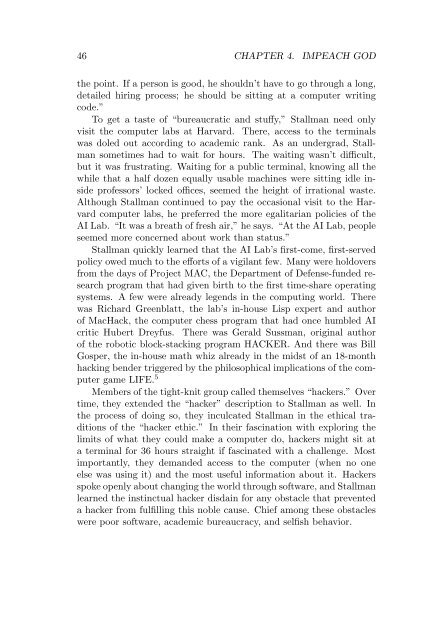You also want an ePaper? Increase the reach of your titles
YUMPU automatically turns print PDFs into web optimized ePapers that Google loves.
46 CHAPTER 4. IMPEACH GOD<br />
the point. If a person is good, he shouldn’t have to go through a long,<br />
detailed hiring process; he should be sitting at a computer writing<br />
code.”<br />
To get a taste of “bureaucratic and stuffy,” Stallman need only<br />
visit the computer labs at Harvard. There, access to the terminals<br />
was doled out according to academic rank. As an undergrad, Stallman<br />
sometimes had to wait for hours. The waiting wasn’t difficult,<br />
but it was frustrating. Waiting for a public terminal, knowing all the<br />
while that a half dozen equally usable machines were sitting idle inside<br />
professors’ locked offices, seemed the height of irrational waste.<br />
Although Stallman continued to pay the occasional visit to the Harvard<br />
computer labs, he preferred the more egalitarian policies of the<br />
AI Lab. “It was a breath of fresh air,” he says. “At the AI Lab, people<br />
seemed more concerned about work than status.”<br />
Stallman quickly learned that the AI Lab’s first-come, first-served<br />
policy owed much to the efforts of a vigilant few. Many were holdovers<br />
from the days of Project MAC, the Department of Defense-funded research<br />
program that had given birth to the first time-share operating<br />
systems. A few were already legends in the computing world. There<br />
was Richard Greenblatt, the lab’s in-house Lisp expert and author<br />
of MacHack, the computer chess program that had once humbled AI<br />
critic Hubert Dreyfus. There was Gerald Sussman, original author<br />
of the robotic block-stacking program HACKER. And there was Bill<br />
Gosper, the in-house math whiz already in the midst of an 18-month<br />
hacking bender triggered by the philosophical implications of the computer<br />
game LIFE. 5<br />
Members of the tight-knit group called themselves “hackers.” Over<br />
time, they extended the “hacker” description to Stallman as well. In<br />
the process of doing so, they inculcated Stallman in the ethical traditions<br />
of the “hacker ethic.” In their fascination with exploring the<br />
limits of what they could make a computer do, hackers might sit at<br />
a terminal for 36 hours straight if fascinated with a challenge. Most<br />
importantly, they demanded access to the computer (when no one<br />
else was using it) and the most useful information about it. Hackers<br />
spoke openly about changing the world through software, and Stallman<br />
learned the instinctual hacker disdain for any obstacle that prevented<br />
a hacker from fulfilling this noble cause. Chief among these obstacles<br />
were poor software, academic bureaucracy, and selfish behavior.


